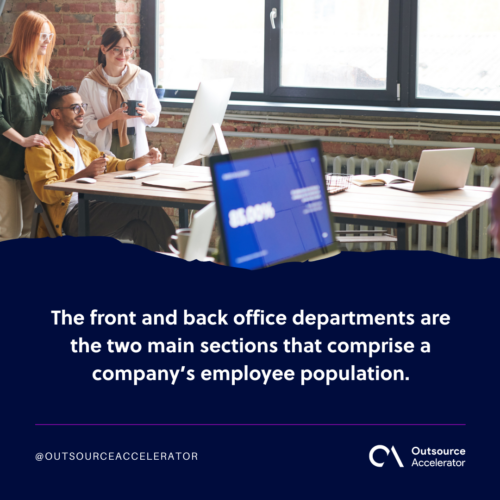Front office vs. back office: Key differences

Rome wasn’t built in a day – the same holds for successful companies.
A typical organization is comprised of two contrary departments: The front office vs. the back office. While people typically interchange these two, each department has key differences that make them unique and relevant to a business’s success.
At its core, the front office represents the face of the company, directly engaging with customers, clients, and external stakeholders.
It consists of departments like sales, marketing, and customer service. Front office employees are entrusted with building relationships and maintaining brand loyalty.
On the other hand, the back office operates behind the scenes. Back office staff offers support to the front office’s efforts with administrative functions, finance, human resources, and IT.
Understanding the difference between the front and back offices is crucial for businesses seeking sustainable success.
Find out the difference between the front office vs. back office in terms of definition, departments, employee responsibilities, and skills in this article.
What is front office? And what is back office?
The front and back office departments are the two main sections that comprise a company’s employee population. They both contribute towards the success of a business.
What is a front office?
The front office is the part of a company that interacts with customers first-hand. Front office employees are also responsible for directly generating revenue.
Examples of front-office departments are sales, customer service, and advisory services.
What is a back office?
On the other hand, the back office refers to any section of an enterprise that has no direct interaction with clients.
The responsibilities of back office employees are essential to an organization’s operations outside of customer engagement.
They are in charge of processes behind the scenes, ensuring all operations run smoothly and supporting the front office staff.
For instance, they may perform accounting tasks or monitor manufacturing processes.
Those are the basic definitions of the contrary concepts, front office vs. back office. The following sections discuss them more in-depth.

Front office vs. Back office departments
Depending on the company, the terms ‘front office’ and ‘back office’ can entail and include different departments.
For instance, let’s say you have a business in the fashion industry.
In the front office, you have your sales staff and store managers. Meanwhile, your administrative personnel and apparel manufacturers are in the back office.
Generally, the front office speaks with customers, offers advisory services, and closes deals. They also partake in post-sales services to ensure client satisfaction regarding their product or service’s quality.
Meanwhile, the back office consists of accounting, human resources, information technology (IT), and data management departments.
Back office employees are often the unsung heroes of a company. They do not come across any customers, yet they contribute to giving the best possible experience to them.
Front office vs. Back office: Differences in employee responsibilities
Departments in the front office and the back office vary in priorities. Check out what they are below:
Front office staff’s responsibilities
Aside from directly generating revenue, the front office plays a significant role in strategy development.
Front office employees help their company study its current operations to determine how to acquire new customers using their existing resources.
Front office workers, including entry-level staff and managers, may contribute their ideas to aid a company in determining how to meet its sales goals and objectives.
These employees also guarantee that the brand maintains a solid public image to continue operating with a good reputation. In addition, they nurture existing customers to acquire their loyalty.
The duties of back office employees
Back office employees, in turn, are responsible for determining how to reduce a company’s operating expenses.
They study the company’s financial documents to determine areas of excess spending.
After that, they recommend ways for their company to eliminate or reduce these unnecessary costs.
Back office employees can also reduce costs for their company by performing proactive maintenance.
Take the IT department, for example. They implement technical skills to build and maintain computer systems. This prevents the need for large-scale repairs or constant implementation of new systems – both of which are costly.
On top of that, IT employees offer technical support to other departments to optimize software programs and cybersecurity.
Accounting employees contribute by preparing financial statements and maintaining the business’ ledger.
Further, data management specialists handle the inputting and storing of data. They ensure accuracy in these tasks so the information can be used for other operations.
Finally, the human resources team manages relations between employees, hires new ones, and administers worker benefits.
Now that the responsibilities of back office and front office employees have been established, it’s the perfect time to discuss their skills.

Employee skills
Since front and back office employees are in varying departments and have different responsibilities, they require distinct skills to succeed in their individual jobs.
The skills of front office workers
The top ability that a front office employee should possess is strong customer service, sales, and communication skills. This is so they can help their company maintain its reputation and acquire loyal customers.
Here are other skills needed from front office employees:
- Active listening. Front office workers convey information clearly and are active listeners. These traits allow them to understand better customers’ needs, desires, and pain points.
- Technical knowledge. Another trait of the good front office staff is the technical knowledge of their company’s offers. When employees know what they’re selling, they can answer customers’ questions easily.
- Marketing. Front office workers are also familiar with marketing strategies. Using these, employees can advertise their company’s products and services and obtain new clients.
- Quick thinking. This is an important trait of front office employees that may often be overlooked. Wit and quick thinking allow front office workers to maintain customers’ attention, approval, and patience, even during delays or other issues.
- Flexibility. Front office employees are flexible. Considering their clients’ personalities, a front office employee is adaptable and can easily match the energy as needed.
- Ceaseless patience. Front office employees are experts in remaining calm at all costs. This helps avoid negative reviews and a possible dent in the company’s reputation.
Back office employees’ skill set
Back office employees don’t require strong sales skills compared to front office staff. However, they can still benefit from having good interpersonal skills for collaborating with their co-workers.
Back office employees are also open-minded, inclusive, and active listeners. They offer each other feedback to optimize their work and, ultimately, their company’s operations.
Other skills needed from back office employees are as follows:
- Conflict resolution skills. Back office employees are experts in maintaining peace and professionalism in employee relations and their workplace. Conflict resolution is mostly found in human resource departments.
- Organizational skills. Back office employees need to be organized. They need this to maintain company records and schedule meetings with the necessary personnel.
- Attention to detail. Pristine attention to detail is a trait possessed by accounting and data management staff.
They both constantly use this skill because their responsibilities entail typing information into their company’s database while ensuring precision.
Without this skill, inputted data may be inaccurate and cause harm to future operations.
- Computer literacy. Most back office employees primarily use computers as their medium for working.
They are proficient in using the main applications needed for their jobs. Accounting staff, for instance, have deep knowledge of digital spreadsheets.
Back office employees can also benefit from learning programs and computer features that aren’t directly related to their main responsibilities.
- Problem-solving. Issues may arise at the office caused by a lack of resources or a broken machine. Critical thinking and problem-solving skills help employees overcome these challenges with little difficulty and disruption to their work.
In addition, employees responsible for manufacturing usually have a strong understanding of compliance standards and manufacturing processes.
Outsourcing front office vs. back office
Finding quality front and back office workers is becoming increasingly difficult because of recent labor shortages. For many businesses, outsourcing is turning into a reliable and cost-effective solution.
Outsourcing helps overcome the challenges of finding quality staff by accessing a global talent pool.
Front office outsourcing
Businesses with a rapidly growing customer base and a focus on their service quality usually require increased front office support.
Some front office functions that you can outsource are sales, advisory, and customer service.
These functions require customer interactions. Thus, they are categorized under the front office.
However, these interactions are not required in person, so these functions can easily be outsourced.
Outsourcing back office services
Like in front office, many back office tasks can be completed digitally.
These include human resources, accounting, data management, quality assurance, administrative tasks, and creative services.
The duties mentioned above are well-suited to be performed offshore. So, as long as your business is offshore-ready, outsourcing will be straightforward.
Outsourcing back office and front office services will grant your company various benefits.
Besides being cost-effective, it will also increase efficiency and productivity.
Trusted BPO companies like SPLACE have all the necessary equipment for high-quality service. They are ready to provide an increase in your operation’s productivity.
Outsourcing also allows you to reallocate resources. You can concentrate on core business operations and leave the menial labor to offshore employees.








 Independent
Independent




